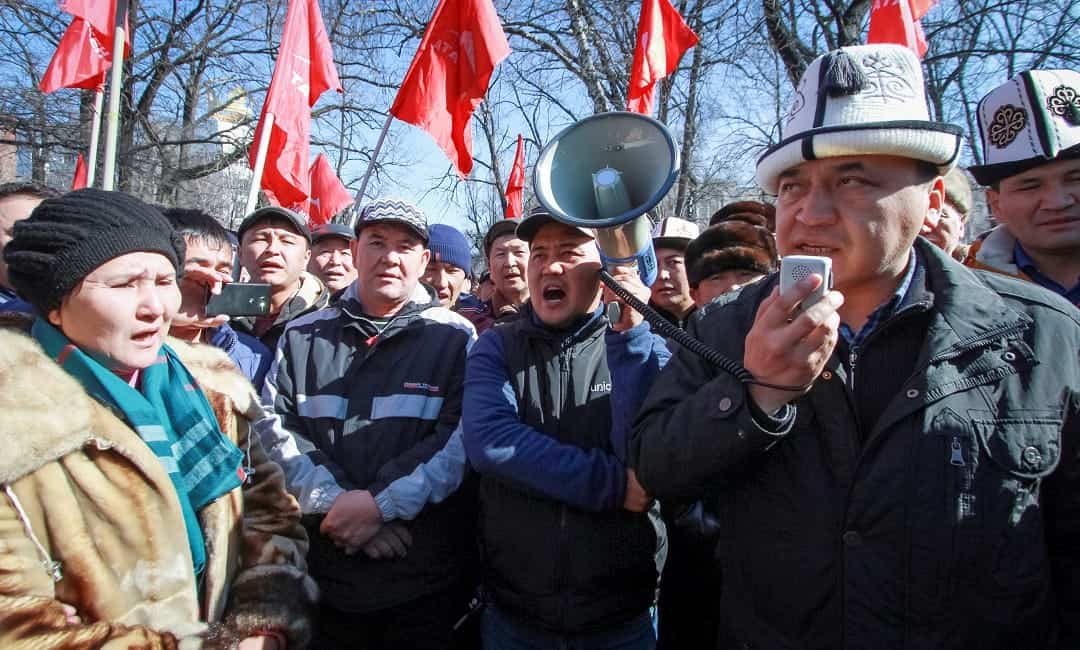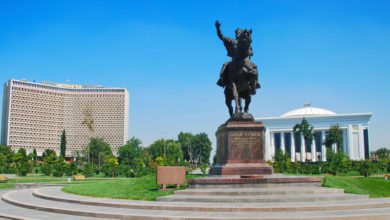For Kyrgyzstan, spring is a traditional season of various rallies. In anticipation of the parliamentary election to be held this autumn, the situation is increasingly escalating in the country.
But times have changed, and the so-called street democracy no longer finds much support among the population, as it was during the unrests that ended in a change of power in March 2005 and April 2010.
Earlier, people used to believe their leaders, but now they don’t. Gradually, society comes to the conclusion that rallies and protests are a favorite tool used by some political forces to blackmail the government.
Rally in Bishkek
On March 2, a planned rally began peacefully in the Ala-Too central square in Bishkek, but demands to release the convicted ex-MP Sadyr Japarov ended in riots and clashes with the police.
The situation got out of control of its organizers, and the aggressive crowd, demanding to release Japarov within an hour, rushed to the Government building. The police tried to stop the demonstrators but in response the angry protesters threw stones at them.
The police managed to disperse the troublemakers with water cannons and tear gas. As a result, 22 people sought medical help, including 19 police officers.
Who were the main organizers of the rally remains unknown.
About Sadyr Japarov
Ex-MP Sadyr Japarov was arrested in 2017 and sentenced to 11.5 years in prison for complicity in organizing a rally in Karakol in 2013 and taking hostage the then Governor of the Issyk-Kul province Emilbek Kaptagaev. Japarov called for nationalization of the largest enterprise in Kyrgyzstan, the Kumtor Gold Company, which is developing a gold mine in the Issyk-Kul province.
Japarov left Kyrgyzstan immediately after the rally in 2013 and returned to the country in March 2017. He was detained immediately upon arrival at Manas Airport in Bishkek.
The Supreme Court of Kyrgyzstan later reduced his prison term to 10 years. In November 2019, the ex-MP filed a petition for clemency to the head of state, but President Sooronbai Jeenbekov said the decision would be made within the law.
No goals or leaders
The very purpose of the rally on March 2 was not set correctly, experts say. The requirement should be enforceable but the demand to release Japarov immediately looked like a provocation.
The extensive list of the rally’s demands covered various topics including fair elections and quality judicial reform, affordable loans, lower electricity tariffs, closing borders to prevent coronavirus, and much more.
Recently, rallies and pickets have lost their meaning, MP Tazabek Ikramov told the Facts.kg newspaper. “There should be a purpose for which people come out to the rally. Each person should understand what he stands for.”
According to political scientists, among the rally’s organizers, there were no charismatic leaders who could inspire the protest masses.
On the eve of the March 2 rally, Sadyr Japarov urged his supporters not to go to the square, saying that provocateurs could take advantage of this but his call was ignored.
One of the rally’s organizers, Sabyr Japarov, Sadyr Japarov’s brother, in a video message posted on March 4, urged his supporters to prevent riots from now on.
“We must not allow provocateurs to use us,” he said.
President’s response
The day after the rally, on March 3, President Jeenbekov held a Security Council meeting and said that state power is obliged to strengthen the country’s economic security and ensure the peaceful life of citizens.
“On March 2, police officers fully completed their task. They defended the right of citizens to a peaceful life and ensured order in the city. As the head of state, I repeat once again — peace in society is above all. The language of ultimatums will not be accepted and all issues must be resolved in the legal field. The law must be respected in the country,” Jeenbekov said.
Situation under control
The authorities allowed the peaceful rally to be held, having prepared the police in advance, and demonstrated their systematic work to curb protests in society.
Not so long ago a series of detentions and preventive conversations with the members of so-called organized crime groups (OCG) took place. The OCG members, and so-called “athletes,” were a powerful force during the riots in 2005 and 2010.
The authorities also managed to neutralize the most respected politicians among the local population.
The public figure Edil Baisalov was appointed Kyrgyzstan’s ambassador to the UK. The mastermind of many protests, Azimbek Beknazarov, has recently been appointed ambassador to Malaysia. Human rights activist Rita Karasartova received a leading position in the civil service. An opposition politician, ex-MP Ravshan Jeenbekov was arrested in a criminal case over clashes in Koi-Tash village on August 7-8, 2019 during the detention of former Kyrgyz President Almazbek Atambayev.
Authorities demonstrate that the situation in the country is under control, political analysts say.
Kanybek Osmonaliev
After the rally on March 2, its moderator, ex-Minister of Education and ex-MP Kanybek Osmonaliev was placed in the National Security Committee detention center until May 3. He is accused of an attempted violent seizure of power.
Osmonaliev did not agree with the charges and said that a provocation had occurred at the rally.
The ex-MP intends to participate in the parliamentary elections, and therefore he participated in the rally, political analyst Sheradil Baktygulov told VB.kg. It is a common practice when politicians rock the situation to be noticed. Rallies remain a tool for gaining political points among the population, the expert concluded.
Protest culture
After the March 2 rally, issues of the culture of rallies became more acute in Kyrgyzstan.
It is wrong when peaceful actions turn into riots and radical calls for seizing power.
Hundreds of rallies take place in Kyrgyzstan every year, but there is still no political culture for holding protests so that people express their demands in a peaceful and constructive manner.
As practice shows, in Kyrgyzstan, certain persons often finance rallies and push people to protest actions to protect their own political and economic interests.
At the last rally, Kyrgyzstanis showed their lack of culture and disrupted public order, MP Bakirdin Subanbekov said at a parliamentary meeting on March 4.
Bishkek residents, remembering the events of the past two revolutions, were again frightened and outraged by the actions of an uncontrolled crowd.
The police dispersed the raging hooligans, but the damage to the city as a whole and to citizens was done. Aggressive protesters smashed dozens of cars, windows of offices, trampled down lawns, set fire to garbage cans, and spoiled other municipal property.
“Certain groups take advantage of the people. It’s a pity that they have provoked our young guys,” the MP said.
Rallies are permitted by law, but they must be held within the law and peacefully. “In our country, rallies always start well, but end in unrest,” he said.
The people should now prepare for spring field work. The whole world is fighting against the coronavirus, and it is not the time to hold rallies, Subanbekov believes.
“Will investors come to us after such events? Tourists will stop coming to us,” the MP concluded.
The Bishkek municipality sees the past rally as riot with attempts to block the streets, attack the police, to seize the Government House, destroy business and municipal property, the press service of the municipality said.
It is quite obvious that the organizers of the rally needed unrest to destabilize the situation in the country. All this worries citizens, businesses and tourists, it said.
Does the country need rallies?
The Pervomaisky District Court and then the Leninsky District Court of Bishkek banned the holding of rallies from March 4 to July 1, 2020.
The ban on rallies caused controversy in society: some supported it while others opposed the decision.
The easiest way for the authorities is to prohibit people from holding rallies, but this will not help solve the real problems that drive people to the streets, MP Iskhak Masaliev believes.
Such an initiative would increase tension in society, ex-MP and ex-Minister of Justice Almambet Shykmamatov said in an interview with the Super Info newspaper. “How dare they step over the Constitution and laws and restrict the rights of citizens?” he asked.
On March 9, the Bishkek City Court cancelled the decision of the Pervomaisky District Court on the ban of rallies.
Lessons learned
The authorities should think about the signals that society sent them at the March 2 rally.
It is obvious that there is growing dissatisfaction among people with the authorities, who cannot build a dialogue with communities to solve problems in a preventive manner. People are unhappy with their quality of life. The reform of the judicial system was announced long ago, but people do not see the results.
Holding fair and open parliamentary elections was one of the main demands of the protesters. So, the upcoming election is an important issue for Kyrgyzstan citizens.
On March 2, protesters easily broke through the police cordon in front of the Government House. The rally was dispersed, but nobody knows how the events would unfold if the crowd was many-fold larger.
The number of politicians including provocateurs will increase as the parliamentary election approaches, experts say. The authorities should highlight all potential conflict points and try to solve problems using not repressive, but communicative measures.
Source: Times of Central Asia






